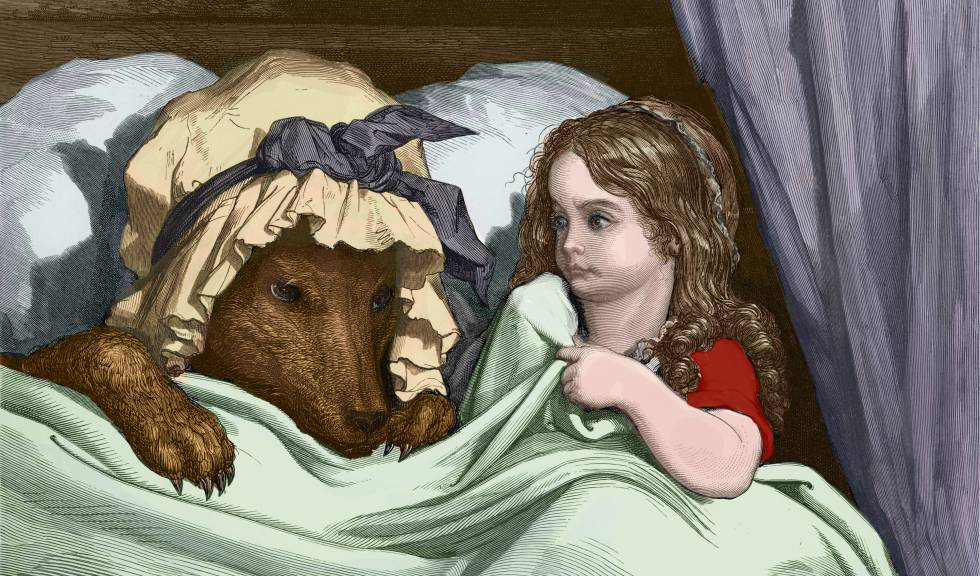
Who’s afraid of the big bad wolf?
It seems that most of us grew up knowing the cautionary tale of “Little Red Riding Hood”, it taught us not to talk to strangers. What most of us don’t know are the much darker and gruesome stories that this childrens tale originated from. As Cole states, “Often stories embody the moral contradictions and inconsistencies in our personal lives, and thus give context and meaning to the social and political narratives of society at large.” These stories date back for decades and the same moral is told no matter the version… do not talk to strangers. However, they are are never explicitly warned to not speak to strangers or wolves. These fears of children talking to strangers is a common one in todays society. Little red riding hood is seen as a week and naive girl who is fooled by a wolf with evil intentions.
All the stories explore the human struggle of leaving children alone and subjecting them to the evils that the world presents. The truth is sometimes dangers are not clearly seen and they can be masked by a fur coat. As in Brother Grimms “Little Red Cap” red riding hood encounters and befriends the wolf completely unaware of the danger she is in and the consequences of the details she shares with the wolf. Even though her mother warns her not to stray from the path she is not warned of all the dangers she can encounter. Young and naive riding hood fails to follow her mothers directions and is ultimately eaten by the wolf. Strangely enough this tale ends in a happy ending with the wolf being cut open by a lumberjack and red riding hood climbing out. This is an unlikely ending especially in the real world one would not be so lucky.
James Thurber’s “The Little Girl and the Wolf” tells a completely different and more empowering version of the story. Upon realizing that laying in the bed was the wolf and not her grandmother red riding hood takes a gun from her basket and shoots the wolf. The story ends with, “Moral: it is not so easy to fool little girls nowadays as it used to be”. And the truth is that in todays society we believe little girls to be foolish, so much so that they can end up believing it themselves. If we arm children with knowledge about the dangers of strangers and the unknown they will be better able to make informed decisions in their life. The other common danger also presented across all these stories is that red riding hood is always a girl. Is this to say that boys are not preyed upon? It is a dangerous oversight that can give boys a false sense of security. This gender stigma can create false illusion that boys can be safe when faced with the wolf. We need to educate that anyone can be the victim, the wolf and the hero. These positions that people can find themselves in are not determined by gender but by circumstance. Going back to Cole, “The whole point of stories is not ‘solutions’ or ‘resolutions’ but a broadening and even heightening of our struggles.” The stories we tell are rooted from our daily lives and no matter what way we choose to tell them they will tell the story of our struggles.


3 Replies to “Who’s afraid of the big bad wolf?”
Such great points you make about gender Stephanie. We talk a lot about the identity offered to girls in these tales, but we leave boys with few choices here too: in these tales, they must either be the bad guy or the hero. Where is there own vulnerability explored? Really enjoyed reading your response.
I loved this. You did an amazing job sewing together your personal take on fairytales as well as the stories we read. I also liked how you touched on the topic of boys and the stigma these stories build on at such an early age. I have three younger brothers and to me this is something I think about a lot. These stories might seem inoffensive but really these little boys are left to with little to no space to pick who get they want to identify in these fairytales.
I like that you pointed out that it gives boys a false sense of security! It definitely doesn’t give them room to think of themselves as ever being a victim, but only as the hero or the villain. I think I also wrote about the more we make children aware of situations the more prepared they would be if something ever did happen! It teaches a great lesson to them.